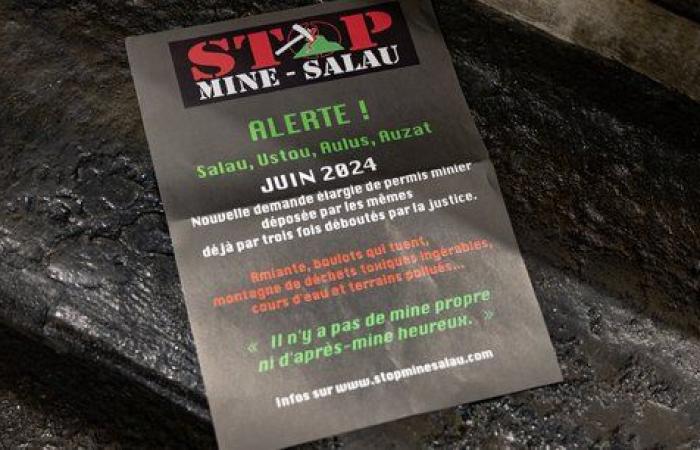
Until the last moment, the location remained confidential. This did not prevent a deputy mayor of the small town of Couflens (Ariège) and opponents from coming to disrupt the press presentation of the NeoMetal company project, one evening this November, in premises at Foix. As a reminder, the latter wants to relaunch the extraction of tungsten in the Pyrenees, exploited in a Couflens mine until 1986.
« In September, the project leaders were received with certain local elected officials at the departmental council to present their project. We were not invited even though we are the first concerned. We learned about this meeting in the press », over Jacques Renoud, first deputy mayor of Couflens and co-president of the Stop Mine Salau association.
Tungsten mine in Ariège: project leaders come out of silence
Concretely, NeoMetal is trying to obtain, from the State services, an Exclusive Mining Exploration Permit (PERM). This precious sesame would allow him to probe the soil over an area of more than 100 square kilometers to assess potential resources. Tungsten is a particularly popular mineral in the defense, aeronautics, space and industrial machine construction sectors.
Further north, in Morbihan, the company Breizh Ressources was born in the summer of 2023 with this ambition: to particularly look for reserves of lithium, gold and rare earths in Breton soils. Locally, here again, the dispute is strong.
“I was informed of this project in January 2024 by the sending of a file by WeTransfer from the prefecture, for a PERM application filed in July 2023. Almost all of our 4,0000 hectares are impacted by this permit, and three other municipalities are concerned. But in the current mining code, municipalities have no place at any time (…). Despite the vote against this initiative by the four municipal councils, the project is moving forward. We have the feeling of losing control,” worries Élodie Le Floch, the mayor of Kervignac.
An expected reform
A public inquiry was carried out in July, but the municipality is not informed of the progress of the file, says the councilor. As a result, its municipal council voted a few days ago to ban – by decree – withdrawals from its municipal soils. Proof that the subject is gaining momentum in the territories, the congress of mayors, which was held recently in Paris, included for the first time in its program in around thirty years a sequence dedicated to the mining industry.
“New forms of mining, a challenge for municipalities”, this is the debate which brought together several dozen local elected officials for almost two hours in a room at the Parc des Expositions, Porte de Versailles.
“We are seeing several PERM requests emerging all over the country. There are possibilities for new mines in Brittany, in the Massif Central and in the Pyrenees. Also, in Nord-Pas-de-Calais, mine gas began to be exploited. In Lorraine, there are research permits around natural hydrogen called white hydrogen. These are considerable advantages for our territories and the country,” comments Jean-Pierre Kucheida, president of the Association of Mining Communes.
In France, Philippe Varin's report, submitted to Emmanuel Macron in 2022, warns of the total dependence on the outside for its supplies of metals necessary for the energy transition. Since then, Europe has approved the Critical Raw Materials Act. The objective? That the Old Continent be able to extract at least 10% of the metals it consumes by 2030.
Critical metals, rare earths: why Beijing scares Europe
Furthermore, the Bureau of Geological and Mining Research (BRGM), which has supported Africa extensively in recent years in the development of its mining industry, is carrying out new mapping of the French subsoil in order to assess its potential.
« We don't know our basement well. For 40 years, we have no longer been interested in it. Furthermore, we were looking for 22 elements before, now we are talking about 55 strategic minerals », explains Christophe Poinssot, the deputy general director of BRGM. Finally, the recent green industry law has marginally reformed the mining code.
“This mining code does not take into account what the mining territories experience (…). It needs to be fundamentally reformed, just as the mining industry must have fundamentally different taxation. The mining royalty is obsolete and dated from the old days. This puts French mining territories in difficulty, the majority of which are classified as the poorest territories in France,” argues the man who was mayor and socialist deputy in Pas-de-Calais.
Post-mine difficult to manage
What about municipalities with old mines? They also do not hide their dismay, and carry a unique message : « Let's close the past before thinking about the future “. For example, thehe salt mine and its 300 kilometers of galleries operated near Varangéville, near Nancy, is at the heart of a legal imbroglio between the municipality and the State.
“For 23 years, the State has refused to authorize us to build housing around the mine for fear of collapse. We have commissioned independent studies that rule out this risk. An 80-unit housing development was blocked and a real estate developer went bankrupt. Over the years, we have gone from 4,300 inhabitants to 3,600. This pushed us to sue the State before the administrative court, which we won. We have just issued the first building permit in the previously restricted area,” says Mayor (Les Républicains) Christopher Varin.
The councilor hopes that his experience will make it possible to adapt the legislation to avoid the depopulation of municipalities which could accommodate new mines in future years. For others, it's a question of image.
« We have a multitude of environmental associations which point out the harmful effects of post-mining on the environment. We find ourselves labeled as a city where the water is unfit for consumption, it's terrible », Testifies the mayor of Salsigne (Aude), Stéphane Barthas, who would like the State to take care of the clean-up of the gold mine whose exploitation was stopped in 2004.
« We still have not finished managing our post-mine despite a cessation of operations in 1990. We have all these state agencies like the ARS or the DREAL which are blocking our reconversion projects for public health reasons. and at the same time the State is calling on us to restart the mines. He's schizophrenic! », annoys Yannick Simon, the mayor of Cabasse on Issole (Var). These numerous mayors are asking the State to fully close this old French mining chapter, before opening a new one.





